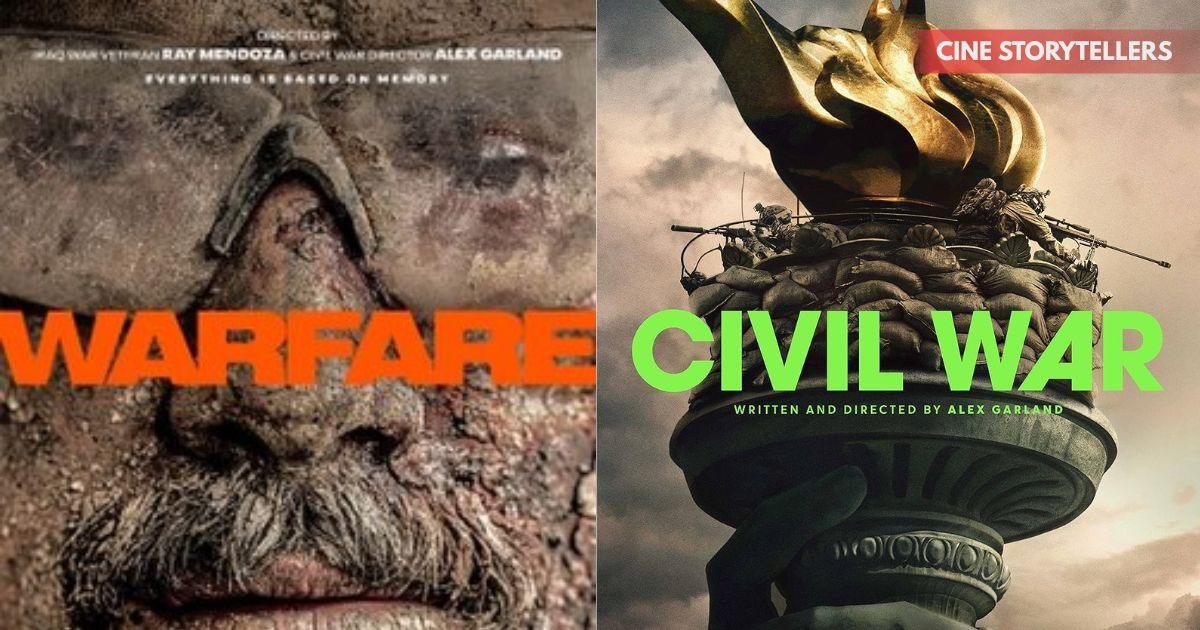Alex Garland, celebrated for thought-provoking films like Ex Machina and Annihilation, has embarked on a bold cinematic journey with his latest projects: Civil War and Warfare. Both films mark a departure from his previous work by focusing not on the causes of conflict but on the human experiences within war. Garland’s approach offers a gripping, immersive look into the realities of combat and the emotional toll it exacts on those involved.
Civil War: A Dystopian America in Turmoil
Released in 2024, Civil War imagines a near-future United States fractured by internal conflict. The narrative follows a team of military-embedded journalists as they navigate the chaos of a nation on the brink of collapse.
Critics have praised the film’s immersive quality, highlighting Garland’s skill in drawing audiences into the immediate dangers and uncertainties of conflict. The story deliberately avoids deep political commentary, instead presenting a raw depiction of life amid civil unrest. While some reviewers note that it lacks exploration of the causes of war, others appreciate the focus on human experience over ideology.
Warfare: Authentic Combat Through Garland’s Lens
In 2025, Garland co-directed Warfare with Navy SEAL veteran Ray Mendoza, offering a stark portrayal of an actual engagement in Ramadi, Iraq, in 2006. The film prioritizes authenticity, capturing the intensity, tension, and emotional strain of combat operations.
From its opening sequence, which depicts soldiers in their downtime before battle, Warfare humanizes military personnel beyond their roles as combatants. The collaboration with Mendoza ensures that the depiction of military tactics and soldier experiences remains accurate and grounded, offering viewers a perspective rarely seen in mainstream war films.
Shifting Focus: From Causes to Experiences
Garland’s recent work represents a notable shift in narrative focus. Rather than analyzing the political or ideological origins of conflict, his films emphasize the lived realities of individuals caught in these crises. This perspective allows audiences to engage directly with the human cost of war, understanding its psychological, emotional, and social consequences on soldiers, journalists, and civilians alike.
By prioritizing immediate experiences, Garland encourages empathy and reflection, prompting viewers to consider the personal ramifications of broader societal conflicts.
Garland’s Evolving Storytelling Approach
Alex Garland is renowned for exploring complex themes in unconventional ways. While earlier works like Ex Machina and Annihilation examined existential and technological dilemmas, Civil War and Warfare focus on realism and human vulnerability in extreme situations.
This evolution highlights Garland’s versatility as a filmmaker. He combines immersive cinematography, authentic character portrayal, and meticulous attention to detail to craft stories that resonate emotionally while remaining intellectually engaging.
Critical Reception
The response to Garland’s war films has been varied but generally positive.
- Civil War: Critics have lauded the film’s immersive depiction of chaos and tension. While some reviewers express disappointment over the absence of in-depth political analysis, many appreciate the human-centered storytelling approach.
- Warfare: This film has received praise for its authenticity and visceral portrayal of combat. Reviewers compare it favorably to classics like Saving Private Ryan and The Hurt Locker, noting its attention to psychological depth and battlefield realism.
Audiences have responded similarly, with viewers commending Garland for offering a fresh perspective on modern warfare and emphasizing the personal stakes of conflict.
Themes Explored in Garland’s War Films
Both Civil War and Warfare explore universal themes that extend beyond their immediate settings:
- Psychological Impact of Conflict: Garland depicts the mental and emotional strain on individuals in war zones, highlighting trauma, fear, and resilience.
- Human Connection: Even in extreme situations, moments of camaraderie and shared humanity emerge, emphasizing relationships amidst chaos.
- Ethics of Combat: While avoiding overt political commentary, the films subtly examine moral dilemmas faced by soldiers and civilians.
- Immersion and Realism: Garland’s storytelling immerses viewers in the immediacy of war, prioritizing experience over explanation.
Through these themes, Garland elevates the war film genre, blending cinematic craftsmanship with emotional storytelling.
Why Garland’s Films Stand Out
Several factors distinguish Garland’s recent films from other war narratives:
- Authenticity: Collaboration with military veterans ensures a realistic depiction of combat.
- Immersive Storytelling: Audiences are placed directly into the chaos of conflict through dynamic cinematography and narrative structure.
- Emotional Depth: The focus on personal experience and psychological impact resonates deeply with viewers.
- Human-Centered Perspective: By concentrating on individuals’ experiences, Garland humanizes war beyond statistics and headlines.
This combination of authenticity, immersion, and emotional resonance allows Garland’s films to engage both general audiences and critics alike.
Conclusion
Alex Garland’s Civil War and Warfare signify a bold evolution in his filmmaking style. By shifting the focus from the causes of conflict to the human realities within war, Garland creates immersive, emotionally charged narratives that highlight the psychological and moral complexities of combat. These films serve as both cinematic achievements and reflective commentaries on the nature of modern warfare, underscoring Garland’s ongoing commitment to innovative, thought-provoking storytelling.
Also Read : Alien: Earth Episode 6 “The Fly” – Complete Review, Recap, and Analysis
FAQs
Q1: Who is Alex Garland?
A1: Alex Garland is a British filmmaker known for thought-provoking movies such as Ex Machina and Annihilation, recently focusing on war and human conflict in Civil War and Warfare.
Q2: What are the films Civil War and Warfare about?
A2: Civil War explores a dystopian America torn apart by internal conflict, while Warfare portrays an authentic engagement of U.S. Navy SEALs in Iraq, focusing on the human experience of combat.
Q3: How do Garland’s recent films differ from his previous work?
A3: Unlike his earlier films that explored existential and technological themes, Garland’s recent works focus on the immediate experiences and psychological realities of individuals in war zones.
Q4: What themes are central to Garland’s war films?
A4: Central themes include the psychological impact of conflict, human connection, ethical dilemmas in combat, and immersive realism.
Q5: How have critics and audiences responded to these films?
A5: Civil War received praise for its immersive storytelling, while Warfare has been lauded for authenticity and emotional depth. Both films have sparked discussion about the human costs of war and the ethics of depicting conflict.
Join our WhatsApp channel for more updates and information about celebrities and entertainment.

I’m Atul Kumar, founder of Cine Storytellers and an entertainment creator with 5+ years of experience. I cover films, celebrities, music, and OTT content with a focus on accurate, ethical, and engaging storytelling. My goal is to bring readers trustworthy entertainment news that informs, inspires, and goes beyond gossip.
Discover more from Cine Storytellers
Subscribe to get the latest posts sent to your email.
